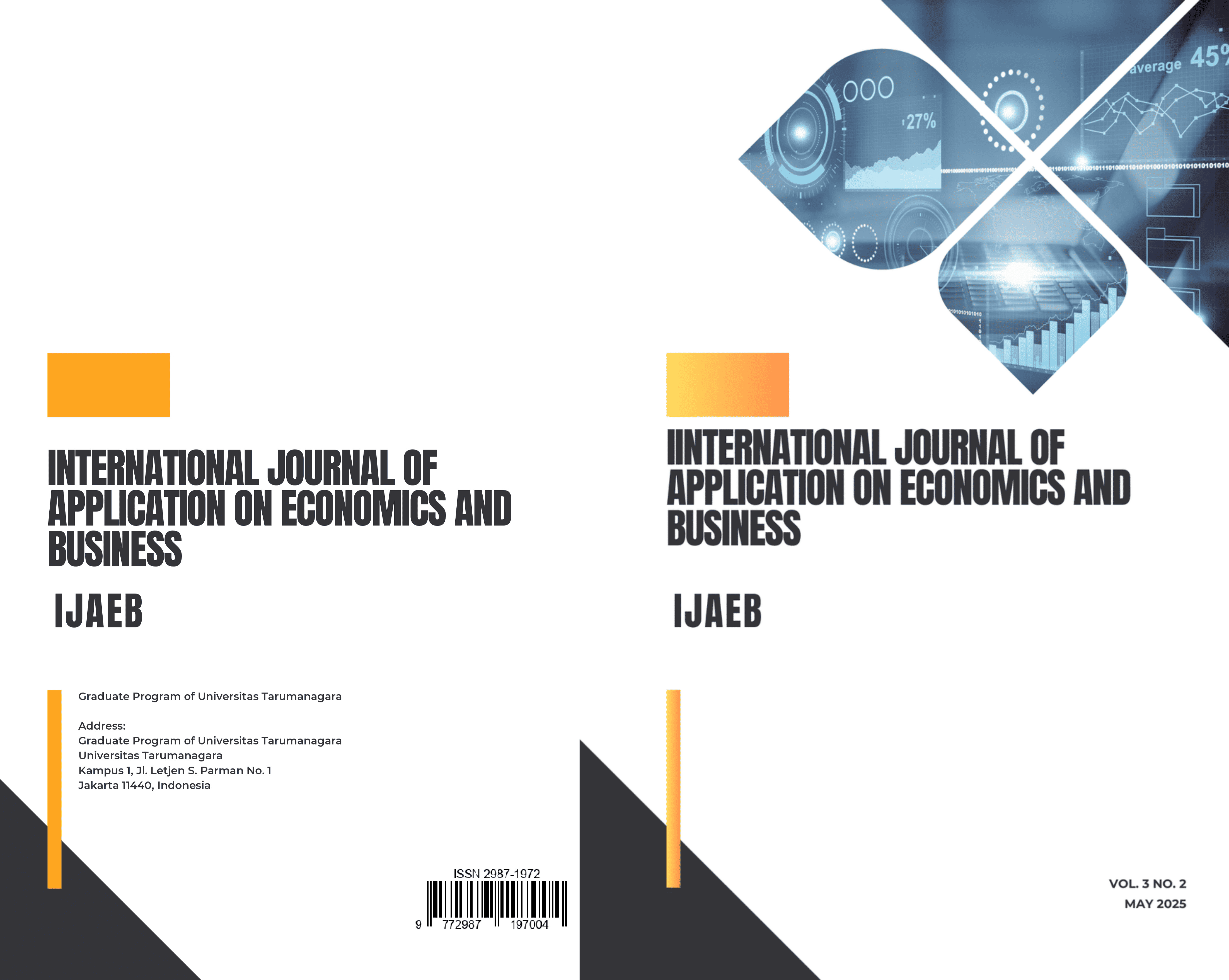THE INFLUENCE OF INDUSTRY TYPE, ENVIRONMENTAL MANAGEMENT PERFORMANCE, AND CARBON INTENSITY ON CARBON EMISSION DISCLOSURE
Main Article Content
Abstract
The IPCC AR6 Working Group I report highlights that greenhouse gas emissions, particularly those generated by human activities, are the primary drivers of global warming, emphasizing the importance of better environmental accountability. In Indonesia, PSAK allows entities to issue separate environmental reports from their financial statements, particularly in industries where environmental considerations are critical. However, there is a significant disparity in the disclosure obligations for carbon emissions across various sectors. This study aims to explore the influence of industry type, environmental management performance, and carbon intensity on carbon emission disclosure among companies listed in the IDX30 index. The study uses a sample of 16 companies for the period from 2019 to 2021, selected through purposive sampling. The data were processed using Eviews 12 software. The findings indicate that all three independent variables collectively influence carbon emission disclosure. However, when tested individually, industry type does not have a significant impact and shows a positive correlation with carbon emission disclosure. Similarly, carbon intensity does not have a significant effect and exhibits a negative relationship with carbon emission disclosure. In contrast, environmental management performance shows a significant positive effect on carbon emission disclosure. These findings indicates that higher environmental management performance is closely related to higher transparency and more comprehensive carbon emission disclosures.
Article Details
Section

This work is licensed under a Creative Commons Attribution-NonCommercial-ShareAlike 4.0 International License.
This journal provides immediate open access to its content on the principle that making research freely available to the public supports a greater global exchange of knowledge.
IJAEB by Graduate Program of Universitas Tarumanagara is licensed under a Creative Commons Attribution-NonCommercial-ShareAlike 4.0 International License.. Permissions beyond the scope of this license may be available at https://journal.untar.ac.id/index.php/ijaeb
References
Choi, B. B., Lee, D. and Psaros, J. (2013), An analysis of Australian company carbon emission disclosures. Pacific Accounting Review, 25(1), 58-79. https://doi.org/10.1108/01140581311318968
Gray, R., Kouhy, R., and Lavers, S. (1995), Corporate social and environmental reporting: a review of the literature and a longitudinal study of UK disclosure. Accounting, Auditing, and Accountability Journal, 8(2), 47-77. https://doi.org/10.1108/09513579510146996
Harits, M. R., & Mutasowifin, A. (2024). Analysis of the influence of financial, carbon, and environmental performance on carbon emission disclosure. IOP Conf. Series: Earth and Environmental Science 1359. https://doi.org/10.1088/1755-1315/1359/1/012095
Ikatan Akuntan Indonesia (IAI). (2009). Pernyataan Standar Akuntansi Keuangan No. 1: Penyajian Laporan Keuangan (Revisi 2009). Ikatan Akuntan Indonesia.
Inawati, W. A., & Taufiqi, M. (2022, September). The Influence of Proper Rating, Industrial Type, Gender Diversity on Carbon Emission Disclosure (Case Study at LQ45 Companies Listed On The Indonesia Stock Exchange 2019-2021 Period) [Paper presentation]. 3rd Asia Pacific International Conference on Industrial Engineering and Operations Management, Johor Bahru, Malaysia. https://doi.org/10.46254/AP03.20220654
Intergovernmental Panel on Climate Change (IPCC). (2023, March 20). Climate Change 2023: Synthesis Report. https://doi.org/10.59327/IPCC/AR6-9789291691647
Irwhantoko, I., & Basuki, B. (2016). Carbon Emission Disclosure: Study on Indonesian Manufacturing Companies. Jurnal Akuntansi Dan Keuangan, 18(2), 92-104. https://doi.org/10.9744/jak.18.2.92-104
Kinley, R. (2016). Climate change after Paris: from turning point to transformation. Climate Policy, 17(1), 9–15. https://doi.org/10.1080/14693062.2016.1191009
Lindblom, C. K. (1993). The Implications of Organisational Legitimacy for Corporate Social Performance and Disclosure [Paper Presentation]. Critical Perspectives on Accounting Conference, New York, United States. https://www.researchgate.net/publication/332071103_Legitimacy_Theory_and_Its_Relationship_to_CSR_Disclosures_A_Literature_Review
Maurer, J.G. (1971). Readings in Organizational Theory: Open System Approaches. Random House.
Meiryani, Huang, S., Warganegara, D. L., Ariefianto, M. D., Teresa, V., & Oktavianie, H. (2023). The Effect of Industrial Type, Environmental Performance and Leverage on Carbon Emission Disclosure: Evidence from Indonesian LQ45 Companies. International Journal of Energy Economics and Policy, 13(4), 622-633. https://doi.org/10.32479/ijeep.14466
Nurlis, N. (2019). Carbon Emission Disclosure in the Proper Rating Company’s Annual Financial Statements in Indonesia Stock Exchange. Research Journal of Finance and Accounting, 10(12), 60–66. https://doi.org/10.7176/RJFA
Otoritas Jasa Keuangan (OJK). (2017). POJK No. 51/POJK.03/2017. Otoritas Jasa Keuangan.
Otoritas Jasa Keuangan (OJK). (2021). Surat Edaran OJK No. 6/SEOJK.04/2021. Otoritas Jasa Keuangan.
Parimita, H. & Najicha, F. U. (2023). Kebijakan sustainable forest management sebagai bagian dari Indonesia’s FOLU net sink 2030. Kertha Semaya: Journal Ilmu Hukum, 11(8), 1793-1810. https://doi.org/10.24843/KS.2023.v11.i08.p05
Priliana, S. A. and Ermaya, H. N. L. (2023). Carbon Emission Disclosure: Kinerja Lingkungan, Carbon Performance Dan Board Diversity. Jurnal Akuntansi, 10(2). http://doi.org/10.30656/Jak.V10i2.4482
Putri, A. V. A., & Yuliandhari, W. S. (2024). The Influence of Carbon Performance, Stakeholder Pressure and ISO 14001 Certification on Carbon Emission Disclosure. ATESTASI: Jurnal Ilmiah Akuntansi, 7(2), 950 - 962. https://doi.org/10.57178/atestasi.v7i2.868
Putri, S. K., & Arieftiara, D. (2023). Carbon emission disclosure, media exposure, carbon performance, and firm characteristics: Evidence from Indonesia. Research in Business & Social Science, 12(3). https://doi.org/10.20525/ijrbs.v12i3.2564
Rahmadhani, S., & Indriyani, R. (2019). Impact of Emissions Intensive Industries And Financial Distress On Voluntary Carbon Emission Disclosure. AKRUAL: Jurnal Akuntansi, 11(1), 1–8. https://doi.org/10.26740/jaj.v11n1.p1-8
Ramadhani, P. & Venusita, L. (2020). Tipe Industri dan Kualitas Pengungkapan Emisi Karbon di Indonesia (Studi Empiris pada Perusahaan Partisipan Sustainability Report Award 2015-2017). AKUNESA: Jurnal Akuntansi Unesa, 8(3). http:/jurnalmahasiswa.unesa.ac.id/index.php/jurnal-akuntansi/
Ratmono, D., Darsono, D., & Selviana, S. (2020). Effect of Carbon Performance, Company Characteristics and Environmental Performance on Carbon Emission Disclosure: Evidence from Indonesia. International Journal of Energy Economics and Policy, 11(1), 101-109. https://doi.org/10.32479/ijeep.10456
Rokhlinasari, S. (2016). Theories in Information Disclosure of Banking Corporate Social Responsibility. Al-Amwal: Jurnal Ekonomi dan Perbankan Syari’ah, 7(1). https://doi.org/10.24235/amwal.v7i1.217
Saptiwi, N. W. T. (2019). Pengungkapan Emisi Karbon: Menguji Peranan Tipe Industri, Kinerja Lingkungan, Karakteristik Perusahaan dan Komite Audit. Jurnal Akuntansi Bisnis, 17(2), 227-240. https://doi.org/10.24167/jab.v17i2.2343
Saraswati, E., Amalia, R. S., & Herawati, T. (2021). Determinants of Carbon Emission Disclosure in Indonesia Manufacturing Company. Asian Journal of Economics, Business and Accounting, 21(3), 1-9. https://doi.org/10.9734/AJEBA/2021/v21i330356

